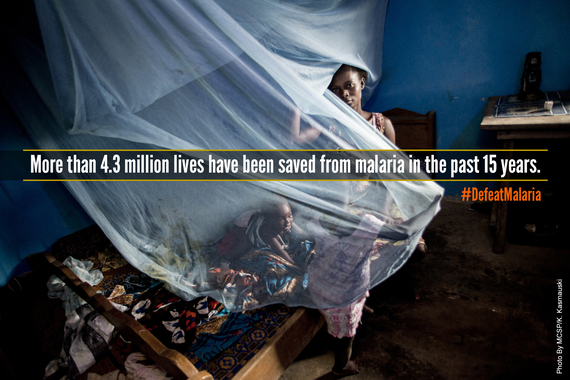Where women and families live should not determine if they live -- this is the philosophy driving Jhpiego's work in 14 countries to defeat malaria, a disease that impacts millions primarily in low-income countries. Pregnant women and children under five years old are particularly vulnerable to malaria because of their compromised immune systems. Malaria in pregnancy often contributes to dangerous health consequences for the mother and her unborn baby, including severe maternal anemia, low birth weight and even death. For children under five, malaria remains the leading cause of death in sub-Saharan Africa.
The theme for World Malaria Day 2015 is Invest in the Future, Defeat Malaria. While at face value this might seem like an obvious declaration, in the fight against this relentless killer of an estimated 584,000 each year, significant investments in improved prevention, diagnosis and treatment can mean the difference between life and death. From public-private partnerships that train health workers to programs that focus on prevention and buy-in from local communities, we know these investments work. We have seen firsthand how, with support from donors and partners, countries across Africa and Asia have helped countless women and children survive malaria, and, most important, have prevented many new cases of malaria.
What do we know works?
Prevention: The best way to defeat malaria is to prevent it from the start. Through access to lifesaving preventive medication and insecticide-treated bed nets, we can save countless women and babies from serious health complications. In 2014, 872,000 women in 12 countries received two doses of preventive medication for malaria in pregnancy through Jhpiego-supported programs.
Early Intervention: Prompt recognition, diagnosis and treatment of malaria among children under five saves lives. Through case management, infected children can quickly receive the treatment they need to stop the progression of the disease and reduce the risk of it spreading to family members or the community through infected mosquitos.
Partnership: In today's complex world of global health, it's nearly impossible to accomplish anything alone. Partnership, especially between public and private organizations, is essential to getting things done quickly and effectively. In Chad and Cameroon, a public-private partnership between Jhpiego, ExxonMobil and the Ministries of Health has prepared 400 health workers to provide education or referral and treatment services in high-risk districts.
Community-Based Care: Bringing services and information to where women and families live is a critical way to increase access. By using community health volunteers, who travel door-to-door sharing information on the risks and symptoms of malaria, the importance of using treated bed nets and the services available at health facilities, we are reducing barriers to care such as lack of transportation, childcare and cost.
Commitment: To bring about real change, governments, local partners and communities need to step up to the plate. Their support for equitable access to prevention and care is an invaluable advocacy tool and motivating force to reach everyone in need.
For decades, malaria seemed to have the upper hand, but today, we are seeing real progress in ending this 100 percent preventable and treatable disease. Using what we know works and building on investments from stakeholders around the globe, we can finally defeat malaria.
